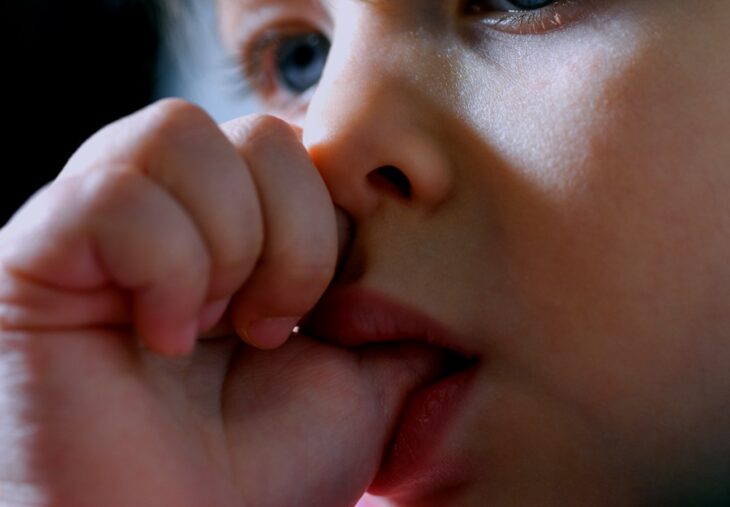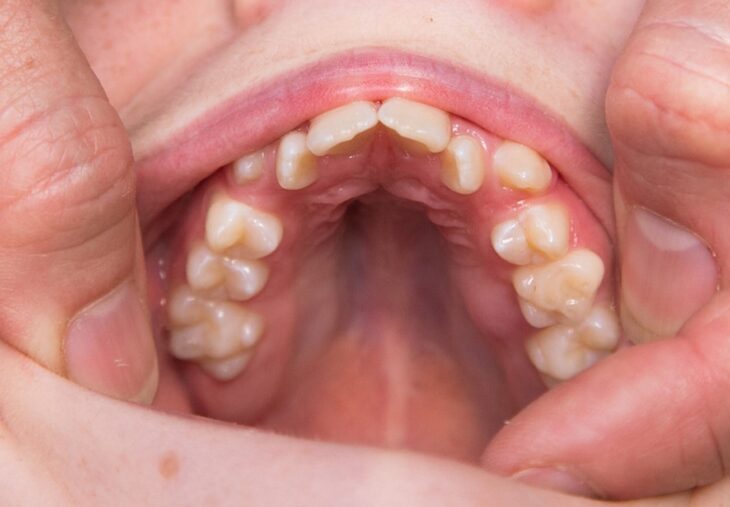Most people think of babies when others are talking about thumb sucking. However, you may be surprised to learn that studies suggest as many as one in ten adults suck their thumb. Of course, the majority of these do this in private to avoid the embarrassment and potential humiliation of being spotted sucking their thumb.

Source: Kiwi Families
Contents
Why People Suck Thumbs
Babies suck thumbs to calm themselves and help deal with pain. For example, teething is generally painful but the process of sucking a thumb releases endorphins. This is because it is pleasurable and soothing. The endorphins counteract the pain of the teeth and help the baby to cope.
Of course, many parents prevent thumb sucking by giving their children dummies. Recent research suggests this is a healthy approach as dummies are less likely to produce the side effects associated with sucking your thumb.
Adults are more likely to suck their thumbs to help deal with stressful situations. This could be related to the same release of endorphins that babies get. It may simply be because it feels nice. In fact, many adult thumb-suckers simply like the way it feels and do it in a variety of situations.

Source: The Hello Doctor Medical Blog
How It Affects Your Teeth
You have probably heard that sucking your thumb will negatively affect your teeth. The good news is that this is not always the case. The age and intensity of the thumb sucking play an important part in this.
Very young children will naturally place objects into their mouths as a way to explore their surroundings and develop a better understanding of the world around them. This is completely natural and unlikely to cause any long-term issues. However, this type of thumb-sucking should naturally stop between the ages of 2 and 4. This is before significant numbers of teeth have arrived.
Should the activity continue then it is likely that the jaw will be altered. The sucking motion pulls the jaw and teeth forward, this will often cause a misaligned bite. It can also cause the teeth to grow at a slight angle causing issues later in life. Alongside this, the sucking motion can put excess pressure on the jawline and gums, effectively elongating the face.
This may not lead to further issues but it does highlight the risk as the actual structure of the face can be changed. Most professionals agree that thumb sucking up to the age of five is unlikely to cause any significant issues. But, after this it should definitely be stopped and, it may be advisable to stop it sooner.

Source: Jungle Roots Children’s Dentistry
Ways To Stop Thumb Sucking
The good news is that you can stop thumb sucking regardless of what age you are. You simply need to know what steps to take.
-
See A Consultant
As soon as you notice your child is sucking their thumb you should arrange to see a reputable dentist, such as specialistkidsdentist.com.au. The aim is to get the bite, jaw, and teeth alignment checked. They will advise you if there are any issues and they can keep records.
This is particularly important as you can return with your child regularly and they can use the records to confirm if any damage is occurring.
Your dentist may talk to your child about the effects of thumb sucking and this can sometimes be enough to stop them.

Source: Indize Kids
-
Talk To Them
The first step in stopping thumb sucking is to simply talk to your child. You will want to know when they thumb suck and if they know why they do it. Simply monitoring when they do it may even give you the why.
Identifying the issue behind the thumb sucking will help you to talk to them about it and potentially resolve the issue. If you can resolve the issue they will no longer feel the need to suck their thumb. However, you will still need to monitor them to make sure.
At the very least you will be building a bond with them and, through empathy, letting them know you understand. That will make it easier for you to tell them to stop, if necessary.

Source: Bespoke Family
-
Focus On Good Behavior
No one likes to be told they can’t do something. That’s why it is best to focus on ‘good’ behavior. Instead of telling them off when they are sucking their thumb, distract them and praise them for doing a good job when they do something noteworthy, specifically hugging a favorite teddy instead of sucking a thumb.
Reinforcing good behavior is a more powerful motivational tool than simply telling them not to do something.

Source: Parents
-
Avoid Situations
If you know what triggers your child to suck their thumb then you can do your best to avoid this type of situation. If you can manage this for several months you will often find the urge to suck their thumb simply passes and they go onto something else.
Stress is one of the most common triggers and this can be the case even if your child is very young. Work out what stress they are under and take steps to alleviate the issue.

Source: Raising Children Network
-
Communication
Never underestimate the power of simply talking to your child. Children are more switched on than most adults appreciate. You can sit your child down and tell them why sucking their thumb is not a good idea. When they understand the possible implications they will stop doing it by themselves! You may be surprised by how much willpower a child has.

Source: Raising Children Network
The Adult Context
If you are dealing with an adult sucking their thumb then the above principles still apply. The key is to help someone understand the implications of sucking their thumbs. They can then consciously choose to stop and tell you what help is needed from you.
That is perhaps the most important part of helping anyone to stop sucking their thumb. You need to be there to support them and guide them away from situations that would result in thumb sucking.
